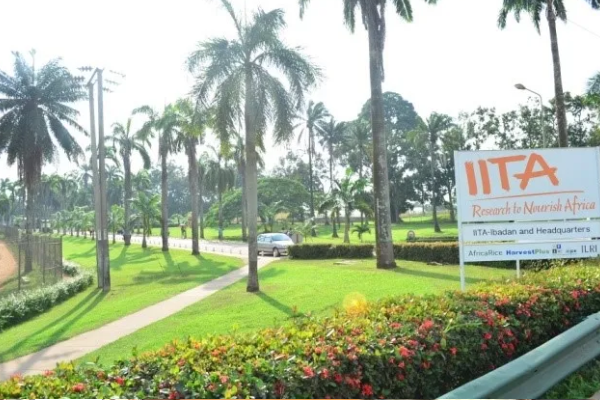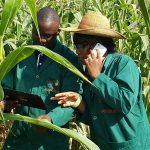A professor of the International Institute of Tropical Agriculture (IITA) has requested that the Nigerian Stored Products Research Institute (NSPRI) work with universities and other research organizations to close the food security gap.
Prof. Lateef Sanni made the request during a two-day internal review meeting of NSPRI with the title “Innovative Post-Harvest Research: A Sustainable Approach for Achieving Food Security in Nigeria,” in Ilorin, Kwara State.
The professor of food science and technology said the collaboration would further enhance the skills of the staff of the institute, who were contributing to reducing post-harvest losses.
“NSPRI staff can enhance their skills more if they collaborate with universities because we have different mandates and interests and skills, hence the need to work together, either South-South, South-East or even outside the country’s collaboration. It will help us to disseminate and fine tune some of the technologies we have to assure the Nigerian populace that we can stabilize the food security,” Sanni said.
He added that there should be collaboration of stakeholders and other research institutes to make the research outputs developed by NSPRI accessible and affordable.
“We have some of the research outputs in NSPRI, but most of these outputs are not known outside except in the institute’s locations and very few villages. Hence, all of us need to collaboratively work together in how to scale the technology to the extent that they will reach millions of our stakeholders.
This is because that is the only way one will be assured that there will be availability of the technology that will also ensure availability, accessibility and affordability of the products going to the market,” he said.
Dr. Patricia Pessu, NSPRI’s executive director, stated that the gathering provided an opportunity for institute researchers to present their work from the time under evaluation and for stakeholders employing NSPRI technology to provide input.
A professor of the International Institute of Tropical Agriculture (IITA) has requested that the Nigerian Stored Products Research Institute (NSPRI) work with universities and other research organizations to close the food security gap.
Prof. Lateef Sanni made the request during a two-day internal review meeting of NSPRI with the title “Innovative Post-Harvest Research: A Sustainable Approach for Achieving Food Security in Nigeria,” in Ilorin, Kwara State.
The professor of food science and technology said the collaboration would further enhance the skills of the staff of the institute, who were contributing to reducing post-harvest losses.
“NSPRI staff can enhance their skills more if they collaborate with universities because we have different mandates and interests and skills, hence the need to work together, either South-South, South-East or even outside the country’s collaboration. It will help us to disseminate and fine tune some of the technologies we have to assure the Nigerian populace that we can stabilize the food security,” Sanni said.
He added that there should be collaboration of stakeholders and other research institutes to make the research outputs developed by NSPRI accessible and affordable.
“We have some of the research outputs in NSPRI, but most of these outputs are not known outside except in the institute’s locations and very few villages. Hence, all of us need to collaboratively work together in how to scale the technology to the extent that they will reach millions of our stakeholders.
This is because that is the only way one will be assured that there will be availability of the technology that will also ensure availability, accessibility and affordability of the products going to the market,” he said.
Dr. Patricia Pessu, NSPRI’s executive director, stated that the gathering provided an opportunity for institute researchers to present their work from the time under evaluation and for stakeholders employing NSPRI technology to provide input.
A professor of the International Institute of Tropical Agriculture (IITA) has requested that the Nigerian Stored Products Research Institute (NSPRI) work with universities and other research organizations to close the food security gap.
Prof. Lateef Sanni made the request during a two-day internal review meeting of NSPRI with the title “Innovative Post-Harvest Research: A Sustainable Approach for Achieving Food Security in Nigeria,” in Ilorin, Kwara State.
The professor of food science and technology said the collaboration would further enhance the skills of the staff of the institute, who were contributing to reducing post-harvest losses.
“NSPRI staff can enhance their skills more if they collaborate with universities because we have different mandates and interests and skills, hence the need to work together, either South-South, South-East or even outside the country’s collaboration. It will help us to disseminate and fine tune some of the technologies we have to assure the Nigerian populace that we can stabilize the food security,” Sanni said.
He added that there should be collaboration of stakeholders and other research institutes to make the research outputs developed by NSPRI accessible and affordable.
“We have some of the research outputs in NSPRI, but most of these outputs are not known outside except in the institute’s locations and very few villages. Hence, all of us need to collaboratively work together in how to scale the technology to the extent that they will reach millions of our stakeholders.
This is because that is the only way one will be assured that there will be availability of the technology that will also ensure availability, accessibility and affordability of the products going to the market,” he said.
Dr. Patricia Pessu, NSPRI’s executive director, stated that the gathering provided an opportunity for institute researchers to present their work from the time under evaluation and for stakeholders employing NSPRI technology to provide input.
A professor of the International Institute of Tropical Agriculture (IITA) has requested that the Nigerian Stored Products Research Institute (NSPRI) work with universities and other research organizations to close the food security gap.
Prof. Lateef Sanni made the request during a two-day internal review meeting of NSPRI with the title “Innovative Post-Harvest Research: A Sustainable Approach for Achieving Food Security in Nigeria,” in Ilorin, Kwara State.
The professor of food science and technology said the collaboration would further enhance the skills of the staff of the institute, who were contributing to reducing post-harvest losses.
“NSPRI staff can enhance their skills more if they collaborate with universities because we have different mandates and interests and skills, hence the need to work together, either South-South, South-East or even outside the country’s collaboration. It will help us to disseminate and fine tune some of the technologies we have to assure the Nigerian populace that we can stabilize the food security,” Sanni said.
He added that there should be collaboration of stakeholders and other research institutes to make the research outputs developed by NSPRI accessible and affordable.
“We have some of the research outputs in NSPRI, but most of these outputs are not known outside except in the institute’s locations and very few villages. Hence, all of us need to collaboratively work together in how to scale the technology to the extent that they will reach millions of our stakeholders.
This is because that is the only way one will be assured that there will be availability of the technology that will also ensure availability, accessibility and affordability of the products going to the market,” he said.
Dr. Patricia Pessu, NSPRI’s executive director, stated that the gathering provided an opportunity for institute researchers to present their work from the time under evaluation and for stakeholders employing NSPRI technology to provide input.
A professor of the International Institute of Tropical Agriculture (IITA) has requested that the Nigerian Stored Products Research Institute (NSPRI) work with universities and other research organizations to close the food security gap.
Prof. Lateef Sanni made the request during a two-day internal review meeting of NSPRI with the title “Innovative Post-Harvest Research: A Sustainable Approach for Achieving Food Security in Nigeria,” in Ilorin, Kwara State.
The professor of food science and technology said the collaboration would further enhance the skills of the staff of the institute, who were contributing to reducing post-harvest losses.
“NSPRI staff can enhance their skills more if they collaborate with universities because we have different mandates and interests and skills, hence the need to work together, either South-South, South-East or even outside the country’s collaboration. It will help us to disseminate and fine tune some of the technologies we have to assure the Nigerian populace that we can stabilize the food security,” Sanni said.
He added that there should be collaboration of stakeholders and other research institutes to make the research outputs developed by NSPRI accessible and affordable.
“We have some of the research outputs in NSPRI, but most of these outputs are not known outside except in the institute’s locations and very few villages. Hence, all of us need to collaboratively work together in how to scale the technology to the extent that they will reach millions of our stakeholders.
This is because that is the only way one will be assured that there will be availability of the technology that will also ensure availability, accessibility and affordability of the products going to the market,” he said.
Dr. Patricia Pessu, NSPRI’s executive director, stated that the gathering provided an opportunity for institute researchers to present their work from the time under evaluation and for stakeholders employing NSPRI technology to provide input.
A professor of the International Institute of Tropical Agriculture (IITA) has requested that the Nigerian Stored Products Research Institute (NSPRI) work with universities and other research organizations to close the food security gap.
Prof. Lateef Sanni made the request during a two-day internal review meeting of NSPRI with the title “Innovative Post-Harvest Research: A Sustainable Approach for Achieving Food Security in Nigeria,” in Ilorin, Kwara State.
The professor of food science and technology said the collaboration would further enhance the skills of the staff of the institute, who were contributing to reducing post-harvest losses.
“NSPRI staff can enhance their skills more if they collaborate with universities because we have different mandates and interests and skills, hence the need to work together, either South-South, South-East or even outside the country’s collaboration. It will help us to disseminate and fine tune some of the technologies we have to assure the Nigerian populace that we can stabilize the food security,” Sanni said.
He added that there should be collaboration of stakeholders and other research institutes to make the research outputs developed by NSPRI accessible and affordable.
“We have some of the research outputs in NSPRI, but most of these outputs are not known outside except in the institute’s locations and very few villages. Hence, all of us need to collaboratively work together in how to scale the technology to the extent that they will reach millions of our stakeholders.
This is because that is the only way one will be assured that there will be availability of the technology that will also ensure availability, accessibility and affordability of the products going to the market,” he said.
Dr. Patricia Pessu, NSPRI’s executive director, stated that the gathering provided an opportunity for institute researchers to present their work from the time under evaluation and for stakeholders employing NSPRI technology to provide input.
A professor of the International Institute of Tropical Agriculture (IITA) has requested that the Nigerian Stored Products Research Institute (NSPRI) work with universities and other research organizations to close the food security gap.
Prof. Lateef Sanni made the request during a two-day internal review meeting of NSPRI with the title “Innovative Post-Harvest Research: A Sustainable Approach for Achieving Food Security in Nigeria,” in Ilorin, Kwara State.
The professor of food science and technology said the collaboration would further enhance the skills of the staff of the institute, who were contributing to reducing post-harvest losses.
“NSPRI staff can enhance their skills more if they collaborate with universities because we have different mandates and interests and skills, hence the need to work together, either South-South, South-East or even outside the country’s collaboration. It will help us to disseminate and fine tune some of the technologies we have to assure the Nigerian populace that we can stabilize the food security,” Sanni said.
He added that there should be collaboration of stakeholders and other research institutes to make the research outputs developed by NSPRI accessible and affordable.
“We have some of the research outputs in NSPRI, but most of these outputs are not known outside except in the institute’s locations and very few villages. Hence, all of us need to collaboratively work together in how to scale the technology to the extent that they will reach millions of our stakeholders.
This is because that is the only way one will be assured that there will be availability of the technology that will also ensure availability, accessibility and affordability of the products going to the market,” he said.
Dr. Patricia Pessu, NSPRI’s executive director, stated that the gathering provided an opportunity for institute researchers to present their work from the time under evaluation and for stakeholders employing NSPRI technology to provide input.
A professor of the International Institute of Tropical Agriculture (IITA) has requested that the Nigerian Stored Products Research Institute (NSPRI) work with universities and other research organizations to close the food security gap.
Prof. Lateef Sanni made the request during a two-day internal review meeting of NSPRI with the title “Innovative Post-Harvest Research: A Sustainable Approach for Achieving Food Security in Nigeria,” in Ilorin, Kwara State.
The professor of food science and technology said the collaboration would further enhance the skills of the staff of the institute, who were contributing to reducing post-harvest losses.
“NSPRI staff can enhance their skills more if they collaborate with universities because we have different mandates and interests and skills, hence the need to work together, either South-South, South-East or even outside the country’s collaboration. It will help us to disseminate and fine tune some of the technologies we have to assure the Nigerian populace that we can stabilize the food security,” Sanni said.
He added that there should be collaboration of stakeholders and other research institutes to make the research outputs developed by NSPRI accessible and affordable.
“We have some of the research outputs in NSPRI, but most of these outputs are not known outside except in the institute’s locations and very few villages. Hence, all of us need to collaboratively work together in how to scale the technology to the extent that they will reach millions of our stakeholders.
This is because that is the only way one will be assured that there will be availability of the technology that will also ensure availability, accessibility and affordability of the products going to the market,” he said.
Dr. Patricia Pessu, NSPRI’s executive director, stated that the gathering provided an opportunity for institute researchers to present their work from the time under evaluation and for stakeholders employing NSPRI technology to provide input.














